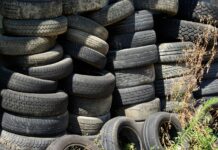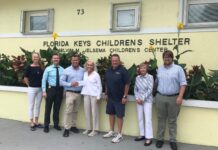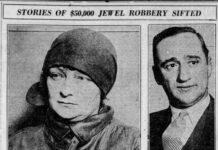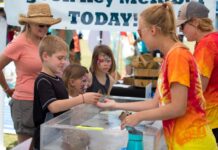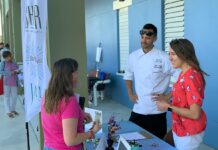All hail the Conch Republic, a shelltastic micronation culled from the drastic need for some serious media spin.
It was 1982, and the war on drugs had officially reached the Florida Keys, well, unofficially. On Sunday, April 18, a serpent wearing mirrored sunglasses slithered across the asphalt stretch called U.S. 1. Thick as a squad car, the beast situated itself across the highway and blocked traffic intent on exiting the Florida Keys. It was just after three o’clock in the afternoon.
The head of the beast was a cadre of federal agents directing Florida Highway Patrol officers and Border Patrol agents to physically put into place the flashing red lights and barricades of a United States border checkpoint. The scene played out in front of Skeeter Dyer’s Last Chance Saloon, the last bar on the mainland before the 18-Mile Stretch delivered drivers to the Florida Keys. In the eyes of everyone living in the Keys, the act was an egregious display.
All northbound traffic departing the islands from a weekend in paradise came to an immediate halt. It did not take long for the resulting snarl of traffic to stretch all the way to Key Largo. The 20- or 25-minute drive it usually took to reach Florida City was now taking hours, three, four, and sometimes more with, for anyone who has taken this particular drive knows, no place to stop for a bite to eat or something to drink or even a place to use the bathroom. International media billed the resulting quagmire as the world’s longest parking lot.
Back up by The Last Chance Saloon, armed men approached each vehicle in an attempt to stem a flow of illegal immigrants from reaching the mainland — or, at least, that was the reason the border checkpoint was allegedly set in place. Officers asked for identification, as well as proof of citizenship, and not just from those driving. Leaving the Florida Keys had become equivalent to leaving Canada or Mexico. Also, those officers searched cars in places far too small for any human to hide, like engines, luggage, and glove compartments. Clearly, the search was about finding more than people. They were looking for drugs which they found in small, recreational amounts.
While the event was not overly prolonged, it went on long enough to ding the tourist economy. To the detriment of those who lived and worked in the Florida Keys and especially those who made their living largely off of tourist dollars, the message the roadblock sent was broadcast loud and clear. The Florida Keys might be America’s backyard paradise, and anyone was welcome to drive down and enjoy the islands, but it was going to be hell getting out. Hotel rooms emptied. Grouper and Key West pink shrimp began to spoil in restaurant refrigerators. Even barstools began to gather a fine layer of dust in some joints.
The government roadblock was choking the life out of the tourist industry, and as local wallets emptied and bank accounts began to drain, normally laidback hackles began to rise. Then Key West Mayor Dennis Wardlow filed an injunction in Miami Superior Court, hoping to have the checkpoint lifted. The case was heard by chief federal judge Clyde Atkins of the U.S. District Court. Just after 2 p.m. on Thursday, April 22, Wardlow and his constituents were told that while the checkpoint would not be dismantled, it would cease to operate in its previous, egregious manner. Wardlow left the courthouse with his head held high.
When he stopped on the courthouse steps to make a statement to a smattering of reporters, his words would change everything. Wardlow, along with a handful of stalwarts from the Key West community, decided that if the United States government was going to treat Key West and the Florida Keys like a foreign destination they would become an independent island nation. Wardlow announced they would be seceding from the United States of America at noon the following day.
Wardlow and his advisors gathered at Clinton Square and declared Key West and Florida Keys the Conch Republic. A uniformed Navy officer in attendance was pummeled in the head with a loaf of Cuban bread (he had been forewarned). Seconds after the republic was declared, the Conch Republic surrendered. As a fallen nation, though not a crestfallen people, Prime Minister Wardlow applied for one billion dollars in foreign aid and war relief. Those funds were never received, but ever since that day, three flags have flown over the Florida Keys: the American flag, the Florida state flag, and the conch shell-emblazoned flag of the Conch Republic.


















